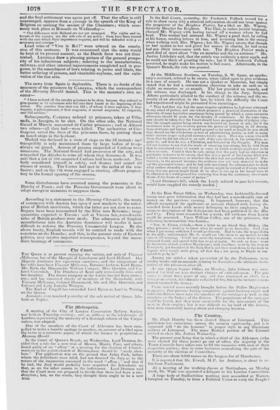At the Bow Street Office, on 1Vednesday, two fashionably-dressed young
men gave information that they had lost a considerable sum of money on the previous evening. It happened, however, that the officers recognized the applicants as persons charged with having, ab- sconded from Leeds with money belonging to their employers. An accurate description of the delinquents had been published in the Hue. and Cry. They were remanded for a week, till evidence from Leeds could be procured. Upon 1Villiam Collet, one of the prisoners, the following memorandum was found- " Nov. 9, Eleven o'clock.—Sent a letter to my friend Geo. Blakey, (the other prisoner,) wishing to know when he would go to Australia. S'sid t hat when 1 got money sufficient I would go directly. I lad to take the wages down to the mill ; unfortunately :Hi. S. would not take them to my mother to take care of till morning. Could not re,ist the temptation, so went down to meet afisresaid friend, and aga evil with him to go) at night. So said, so done : wunt by the twelve o'clock couch to 31:mchester ; took omnibus ; went by the train to liverpthil; got !weal:fist at the It tilt II otul, mu then went down to the dock to inquire what vessels were going oil* that day ; one going to Rhyde at one agreed to gut by it."
Among time at ticks taken possession of by the Policemen, were sundry books and memoranda relating to Australia—the ultimate desti- nation of the priM)111'/'S after oil.
At the Queen Square Office, on Memlay, John Gibson was eons- Hilma4 for trial IE 50mw distinct charges of embezzlement.
The pri-
stiller is :ilium forty years of age, and was employed as clerk to a
vi wear- reliant, for u heal he collected debts, but in the instanecs men. tiotied tetained the money.
From several eases recently brought before the Police Magistrates it appears, that persons having complaints against hackney-co:tell anti eabriolet-drivers :most take the numbers of the carriages as well as the numbers on the badges of the drivers. Ii, e proprietors of the carriages could be fin i id, end they were answerable for the misconduct of the men in their employ ; but it was difficult to lay hold of the drivers, who were constantly moving about and changing !DEISM'S.


























 Previous page
Previous page